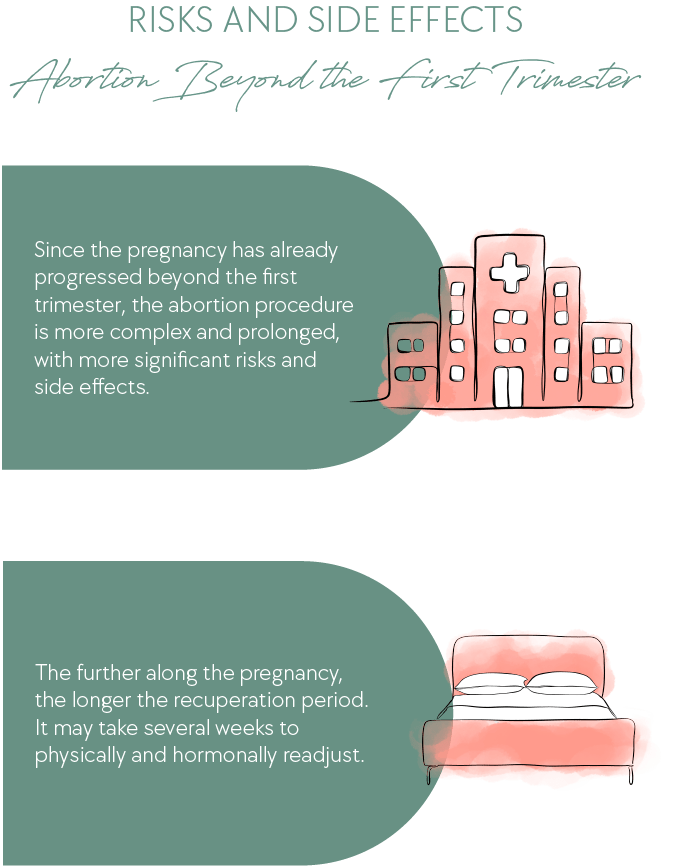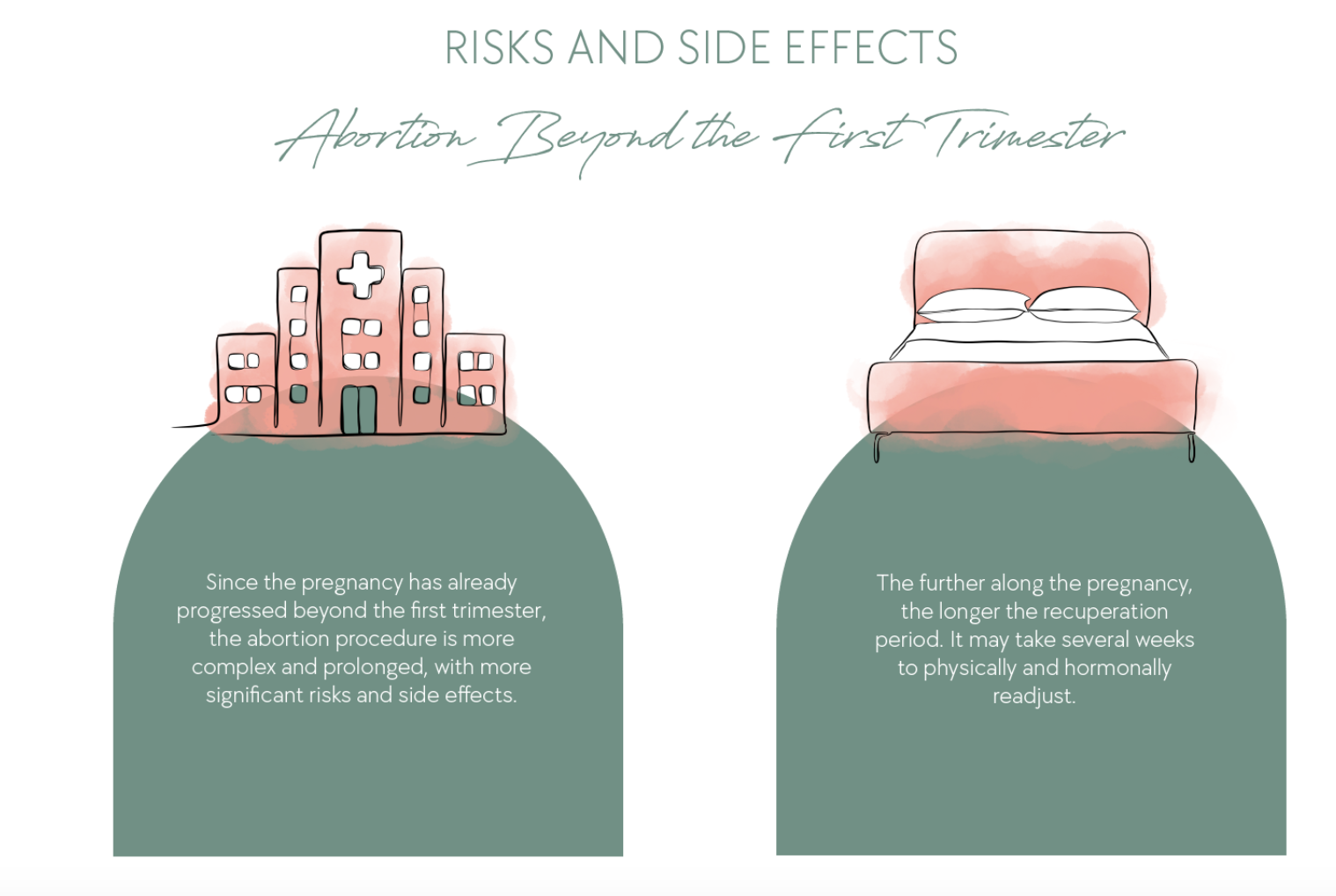What Is a Late Termination of Pregnancy and When Is It Legal?
- Late-term abortion refers to any abortion performed after the first trimester. This is a colloquial rather than a medical term.
- In most areas, exceptions allow for abortions until birth, such as rape, incest and the mother's health.
- Late-term abortions require methods other than those used within the first 12 weeks.
📖 This article provides information on late-term abortions (e.g. gestational limits and abortion methods).
- ⚖️ Wondering whether to have an abortion or not? – Take the Abortion Test
What Are Late-Term Abortions and How Late in Pregnancy Can You Have One?
A late-term abortion is understood as an abortion that takes place after the first trimester (i.e. after the first 12 weeks of pregnancy). Theoretically, abortions are possible up until birth. A distinction is usually made between:
- Second-trimester abortions, ending at viability* at around 24 weeks
- And third-trimester abortions, starting around week 25.
*Viability is the stage at which survival outside the womb is possible.
When Is It Legal to Have a Late-Term Abortion?
If there is evidence of foetal abnormality or significant risk to the life of the mother, there is no gestational limit on abortions. However, in the absence of these indications, it is illegal to procure an abortion beyond 24 weeks in the United Kingdom.
Conditions for Late-Term Abortions
If a doctor deems an abortion necessary to save the mother's life, abortion is permitted. Other factors such as rape and incest are only taken into consideration to allow for abortions up to 24 weeks.
This table provides you with information on late-term abortion exceptions in the UK. The numbers indicate the time limit for abortion in weeks of gestation, counting from your last menstrual period (LMP), according to the specific reason provided.
Region | Regular Limit | Foetal Defect | Rape | Mother's Health | Mother's Life |
Great Britain | 24 Weeks LMP | unlimited | 24 Weeks LMP | 24 Weeks LMP | unlimited |
Northern Ireland | 24 Weeks LMP | unlimited | 24 Weeks LMP | 24 Weeks LMP | unlimited |
2nd and 3rd Trimester Abortions
- Legal parameters for abortions are usually given with the mother's well-being in mind. The risk of a late-term abortion is weighed against the trauma of the abortion indicator. Therefore, socio-economic reasons and general health concerns are commonly accepted as abortion indicators in early pregnancy only. Conversely, if the mother’s life is in danger, she is always permitted to have an abortion.
- For more information, go to When is an Abortion Performed to Save the Life of the Mother?
- The severity of foetal defects is usually considered. Abortions are often limited to defects that would drastically shorten the child's lifespan.
Abnormal findings or detection of disability would make you feel like your world has been flipped upside down. Dreams and plans come to a standstill as the situation takes on an enormous weight.
It is natural to desire your child to be healthy — this shows you care!
Maybe you just had a stressful experience at an antenatal examination and came upon this article hoping to find clear answers.
🩺 Facing the question of whether to have a foetal-defect abortion or not? – Take the Self-Assessment!
🕰 If you are facing this decision, you probably still have time to envision several different scenarios of what your future could look like.
However, many women say they feel like they are running a marathon - battling their hopes and fears. Your medical provider may have also given the impression that you must decide and act quickly.
Process of Late-Term Abortions
Should a woman fall within the spectrum of exceptions and choose to pursue a late termination of pregnancy, the following steps can be expected:
- It is usually necessary for a doctor to diagnose a medical indication for abortion.
- Frequently, informed consent is required. In this case, a state-mandated counsellor will present you with information on all your options to ensure that your decision is given due deliberation.
- A blood test and an ultrasound are often performed at a preliminary appointment.
Late-Term Abortion Methods
Late terminations of pregnancy, performed after the first trimester, require their own methods. Neither D&Cs nor vacuum aspirations are used past the first 12 - 14 weeks.
Two methods are used for late-term abortions:
- Dilatation and Evacuation – D&E (Uterine Suction Curettage)
This is a surgical procedure using vacuum aspiration performed in the second trimester. A suction catheter removes the amniotic fluid. Using forceps, the foetus is then dismembered and extracted in pieces from the womb. Finally, suction and curettage is performed to ensure that all foetal material has been removed.
25-44% of second-trimester abortions are performed via D&E in England and Wales (GOV.UK).
Medications are used to start the process of labour and delivery. If the foetus is too young to survive outside the womb, it usually dies during the birthing process. Once the foetus has reached 22 weeks and could potentially be born alive, a potassium chloride injection is given to stop its heartbeat. This leads to foetal demise.
This procedure can be performed in the second and third trimester of pregnancy.
Induction abortions account for most other second and third-trimester abortions (20-38% of late-term abortions in England and Wales). Unlike the other abortion methods, which are outpatient, inductions usually require a two- to three-day hospital stay.
🏥 Abortion Methods: What do I need to know? — Take the Test!


Pregnant After the First Trimester and Searching for Answers…
You may be facing the decision of whether to have a late-term abortion. Your pregnancy may have taken an unexpected turn. This is something you could not have foreseen. Or perhaps you only just found out you were pregnant. Since you are already beyond the first three months of pregnancy, you are now considering a late termination of pregnancy…
Several aspects play a role in making a late-term abortion more difficult than an early termination:
- The further along you are in the pregnancy, the greater the risks and side effects.
For more details, go to Risks and Side Effects of Late-Term Abortions. Knowing that the baby is close to, or even beyond, the point at which it could survive outside the womb also adds a greater emotional component.
🛤 Are you concerned whether an abortion could affect you long-term? — Take the Test
You are probably under immense pressure right now. Many women in your shoes have had the experience that the people around them felt at a loss for words and did not know how to respond.
- Our desire for you is that you would not be left stranded but that you would receive the care you deserve. That is why we have compiled resources that are tailor-made for your situation.
- ⚖️ Late-term abortion: Yes or no? Take the Abortion Test and receive an immediate evaluation.
- 💡 Your greatest concern —Take the Solutions Finder Test.
The Stats: Late-Term Abortions
It is estimated that 10-15% of abortions worldwide happen after the first trimester (Reproductive Health Matters 2010).
In 2021, 6% of abortions in the UK were performed beyond 13 weeks (GOV.UK).
Our Top Picks for You:
Disclaimer:
While we strive to provide you with the most up-to-date information possible, abortion regulations are constantly shifting. Profemina takes no responsibility for the accuracy of the numbers provided.






















